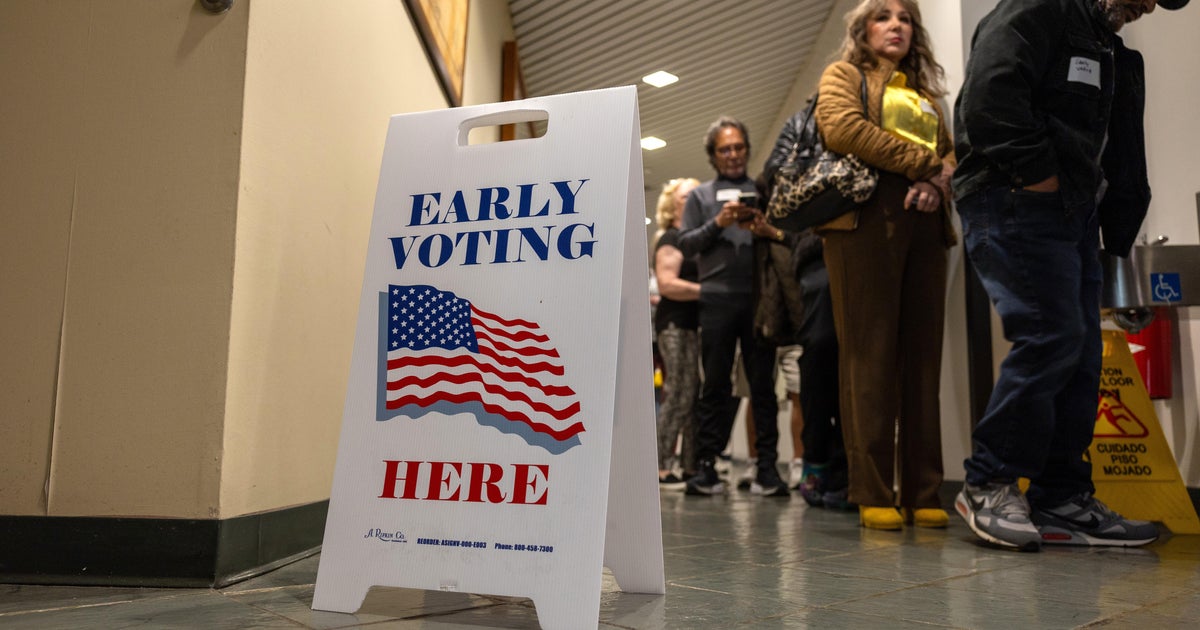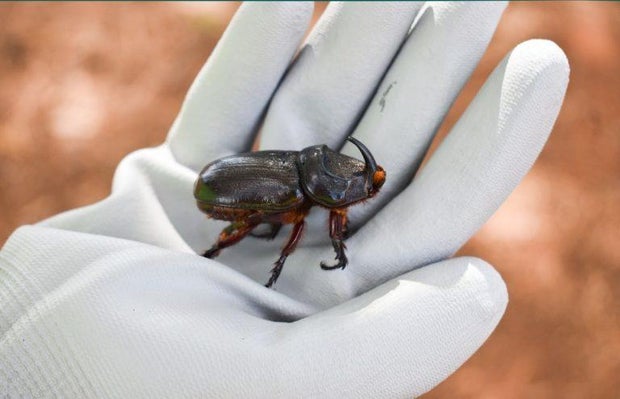CBS News
Hawaii races to stop spread of tree-killing rhinoceros beetles, invasive species that can fly 2 miles and lay 140 eggs

Hawaii is ramping up its efforts to stop the spread of coconut rhinoceros beetles, an invasive species that has expanded its presence drastically since first being detected in the state a decade ago.
According to the state’s Invasive Species Council, the beetles — which are native to Africa, China and Southeast Asia — are about two inches long with a C-shaped body. They are nocturnal and can fly up to two miles when looking for a food source, and female beetles lay 50-140 eggs in their lifetime, which is typically four to nine months.
First found in Hawaii in 2013 at the Joint Base Pearl Harbor-Hickam, the invasive species spread across the state last year and has been detected multiple times in recent months, officials say. Coconut rhinoceros beetles do not bite but may carry disease since they live in dirt and mulch, experts say.
According to the Hawaii Invasive Species Council, the beetles can kill coconut trees, palms and other tropical crops like kalo and banana, once they bore into them, which ultimately “jeopardizes the economy, entire ecosystem, agriculture and food security.”
Hawaii Department of Natural Resources
Earlier this month, Honolulu removed an infested coconut tree at Kaiaka Bay Beach Park in an effort to control the invasive species, Hawaii News Now reported.
“It’s another sad day for us. We don’t like removing trees, especially trees like the coconut. Not only is it the ‘Tree of Life’, culturally very, very important to the Hawaiian people, so today is another sad day, and there’ll be more sad days,” said Roxanne Adams, the administrator of the city’s Department of Parks and Recreation Division of Urban Forestry.
On the North Shore, about 80 trees are slated for removal because of the beetle, the station reported.
“The unfortunate truth of this situation right now is it’s going to get worse before it gets better,” said Nate Serota of the Department of Parks and Recreation. “We’re going to have to start removing more and more of these palms, really out of concern for public safety.”
More than 100 traps have been set up around the state and regularly monitored, and earlier this month, the state designated Oahu as infested by the beetles. Under a new rule, landscaping materials such as compost, wood chips, mulch, and palms taller than four feet are not allowed to be shipped from Oahu.
Hawaii board bolsters pest control powers
The Hawaii Board of Agriculture has approved rule changes to help control the spread of invasive species following about a 20-month delay.
The holdup caused a public outcry because the rule changes are intended to help the Agriculture Department stem the movement of commodities infested by pests, including coconut rhinoceros beetles.
Once finalized, the rules will prohibit the movement of infested materials like soils and compost between islands and increase inspection requirements. They also will include specific examples of invasive species to help guide the department and industry.
Neither proponents nor opponents of the rule changes seemed fully satisfied following a Tuesday board meeting. Agriculture industry representatives called them confusing, while some proponents said they don’t go far enough.
The board members, who approved the changes unanimously, agreed that invasive species need to be better addressed, and quickly.
“This is about an all-hands-on-deck approach to managing, preventing – and hopefully eradicating – the ongoing cycle of invasive species,” Big Island board member Dianne Ley said.
That sentiment echoed messages from federal invasive species experts touring Oahu this week to research the effects of invasive species on island communities. They will produce a report to advise the U.S. government how it can help Hawaii and island territories, as well as associated Micronesian nations.
Local advocates of taking action against invasive species addressed the federal advisers Monday, pointing out the gaps in Hawaii’s response and regulations addressing the problem.
The agriculture board’s action on Tuesday was a significant step following 20 months of waiting since board chairperson Sharon Hurd pulled the proposed rule changes in the face of industry concerns.
Coconut rhinoceros beetles were detected for the first time on islands statewide in subsequent months, while little fire ants caused serious concern on Oahu’s windward coast.
Compost, soil and green waste, as well as the nursery trade, have been been blamed for the movement of those pests.
The board had approved interim rules in the meantime aimed at restricting the movement of host material for the beetles and ants.
On Tuesday, Hurd voted in favor of the permanent changes.
The newly approved rules have buoyed the hopes of environmental advocates, including Joseph Watt of the KEY Project, a Kualoa-Heeia community organization.
“I’m in strong support of these amendments; we need much stronger regulatory oversight of the movement of these materials,” Watt said.
Hawaii Floriculture and Nursery Association President Eric Tanouye on Tuesday said his membership would be more open to the rule changes as long as the agriculture department provides better guidance on how to comply. About 11 months ago, Tanouye said the revised rules would “kill agriculture.”
The rule changes, while welcome, should be the benchmark for further work to increase the department’s regulatory powers, said Stephanie Easley of the Coordinating Group on Alien Pest Species, which is affiliated with the University of Hawaii.
Additional rule changes are needed to prohibit the sale of infested plant materials, Easley told the board on Tuesday.
“Islands are a bellwether for invasive species impacts”
Questions were raised about how the department would implement the rules, considering its history of struggling to find staff and funding. The signing of Act 231 this year put about $10 million aside for the department to bolster its invasive species work and biosecurity, after lawmakers pressured the DOA to do a better job.
Ten pest control positions were created with that funding, and Plant Quarantine Branch Manager Jonathan Ho said they are in the process of being filled.
On Tuesday, board members requested that staff give monthly updates on progress in pest control, particularly as the agency works through finalizing the rules and implementing the programs under Act 231.
The rule changes will go before the Small Business Regulatory Review Board before reaching the governor’s office for a final sign-off.
Federal government officials and invasive species experts, meanwhile, are finalizing a report that will be delivered to the National Invasive Species Council, which oversees the expansion of pest management efforts nationwide and across several national agencies.
The three-day meeting in Honolulu of the federally appointed Invasive Species Advisory Committee, which includes two members from Hawaii, concludes Wednesday.
On Monday, Hawaii officials and invasive species workers and academics shared their views on Hawaii’s invasive species problems.
“We need resources, we need people and we need capacity,” said Chelsea Arnott, Hawaii Invasive Species Council program supervisor.
Representatives of the U.S. departments of Agriculture, Interior, Defense, Homeland Security and Health and Human Services were among the attendees.
The committee’s draft recommendations cover seven major areas, such as expanding federal support for island-based invasive species efforts, increasing island-specific research and infrastructure needs and addressing shortcomings in rapid response to species detections.
“Ultimately, islands are a bellwether for invasive species impacts, both nationally and globally, and are indicative of what continental communities and ecosystems may experience in the future,” the draft report states. “Accordingly, science, systems, and solutions developed to address invasive species on islands may be widely applicable across the United States.”
CBS News
Expert breaks down what to know about dog’s behaviors

Watch CBS News
Be the first to know
Get browser notifications for breaking news, live events, and exclusive reporting.
CBS News
What to know about estate planning

Watch CBS News
Be the first to know
Get browser notifications for breaking news, live events, and exclusive reporting.
CBS News
Early voting for 2024 election underway in dozens of states with 28 million ballots cast so far

Washington — With early voting underway in all seven battleground states and in another three dozen states, millions of Americans have cast their ballots already.
More than 28 million people have voted early so far, according to data from the University of Florida’s Election Lab, with the most voting by mail. Democrats are outpacing Republicans in casting their ballots early, data from 25 states that report party registration shows.
More Republicans have cast roughly 327,000 more ballots in person so far, while more Democrats have returned 1.3 million more mail ballots than registered GOP voters, according to the Election Lab.
Record number of ballots cast in some states
The high numbers of voters casting their ballots before Election Day on Nov. 5 has set records in at least two battleground states, North Carolina and Georgia. In Georgia, which President Biden won in 2020, more than 25% of active voters have already cast their ballots, according to Gabe Sterling, chief operating officer for secretary of state.
And in North Carolina, where the western part of the state was devastated by Hurricane Helene, more than 353,000 people voted on the first day of the state’s early-voting period, which was Oct. 17. That figure surpassed the prior record for the opening day of early voting: more than 348,000 in 2020, according to the North Carolina State Board of Elections.
Both surpassed the mark of 2 million votes cast Wednesday. Early voting in Georgia lasts until Nov. 1, and in-person early voting runs until Nov. 2 in North Carolina.
In Nevada, another battleground state, more than 397,000 voters had cast ballots as of Tuesday, with 40% from registered Republicans, according to the secretary of state.
David Becker, a CBS News election law contributor and the executive director of the Center for Election Innovation and Research, cautioned that the breakdown of early voting by party does not portend the outcome of the election.
States report party registration data, and a voters’ political affiliation may not correspond with the candidate who won their vote.
“We won’t know until the votes get counted,” Becker said.
Still, he said that the more early voting there is, the better it is for election administration and security. Those who have already cast their ballots no longer risk standing in long lines on Election Day or getting to their polling place after it’s closed, and they won’t be subject to disinformation that could impact their vote.
2020 early voting
During the 2020 election, nearly 60 million people cast a ballot by Oct. 25, according to the U.S. Elections Project, run by Michael McDonald, a political science professor at the University of Florida who also runs the Election Lab. Democrats doubled the number of Republicans who returned mail ballots by that point in early voting, while Republicans had a slight edge over their Democratic counterparts in voting early in-person.
But 2020 was a “unicorn election,” Becker said, as the COVID-19 pandemic led to higher numbers of people voting by mail and states sought to make it easier for them to do so. And former President Donald Trump spent the months leading up to the last presidential contest falsely claiming that mail-in voting was fraudulent, “corrupt” and “horrible.”
Still, in the years before the 2020 contest, more and more states were offering voters the chance to vote early, either by mail or in person. In the 2000 general election, 24 states had early-voting options, and that number jumped to 28 in the 2008 election, and 31 states and the District of Columbia by 2016, according to an analysis from the Center for Election Innovation and research. For the 2024 election, 47 states give voters ways to cast ballots before Election Day.
And over the last five election cycles before 2020, the share of ballots cast early steadily rose: from 14% in 2000, to 21% in 2004, 31% in 2008, 33% in 2012 and 40% in 2016, the Center for Election Innovation and Research found.
Trump’s shift on early voting
While Trump has for this year’s presidential election continued his crusade against mail-in and early voting at times, he has urged supporters to cast their ballots early in other instances. During a Pennsylvania rally in September, he called the ability to vote before the election “stupid” and claimed it invited fraud.
But in a radio interview with Fox News host Brian Kilmeade that aired Wednesday, he urged his supporters to cast their ballots early and even suggested he would do the same in Florida.
“I have the old standard of the Tuesday vote and all. A lot of people like to vote, and I really miss you know, the main thing to me is you’ve got to vote. You got to vote,” he said. “Voting early, I guess, would be good. But you know, people — I’ll have different feelings about it. But the main thing is you got to get out. You got to vote. And I’ll be voting early. I’ll be running early.”
In a June video for the Republican National Committee, Trump said GOP voters must use “every appropriate tool available” to beat Democrats, whether early, absentee, by mail or in-person.
The RNC has been working to encourage voters to bank their votes by voting as early as possible through absentee voting, in-person voting and ballot harvesting where it’s allowed.
“We want you to bank your vote. We don’t want you to have to worry about waiting in super long lines on Election Day,” Lara Trump, co-chair of the Republican National Committee and the former president’s daughter-in-law, said during an interview Sunday with Fox News.









